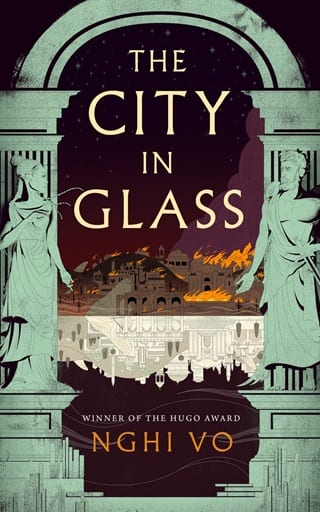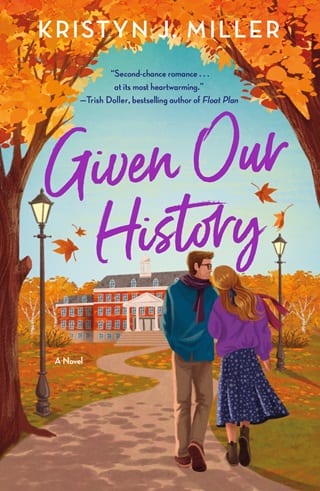Chapter Eight
EIGHT
Two summers later and Vitrine had cleared out the streets. At first she had taken what was left of her dearly departed to the valleys beyond the city, hauling them in a handcart and then in a wagon pulled by a feral horse she had broken for the purpose. The horse was a stout bay with the noble head of a conqueror’s mount and the short and blocky body of a butcher’s pony. After she had tamed some of the willfulness out of him and seduced him with the promise of the wild rice that had started to grow in the high rivers again, they got on quite well as he pulled his burden of dead people to the valleys.
Cartload by cartload Vitrine thought she was making a dent, but then came the day when she went down an alley she scarcely remembered off Tintagel Street. The remnants of the dead, the bones, the metal of their belt buckles and their swords and their jewelry, so much, and all tossed among the rubble. She picked up one of the iridescent beetles crawling on a half-buried skull and squashed it angrily between her fingers before flicking it away with just the softest ripple of guilt.
The horse butted his heavy oversize head against her shoulder, and she pushed him away so hard he nearly went down on his hocks. Then she simply sat for a while in the silent street, tracing her fingertips along the nearly intact rib cage of a girl whose flute music she could still hear in her head.
In just an hour or so, she was back on her feet, lifting her chin angrily. Where she lacked resolve and peace, anger would do, and she unhitched the horse from the wagon.
“The wild rice can be found north along the river,” she told him. “The shoots are small and green and tender now. You can go find them and eat until you explode for all of me.”
With the horse fled, she took her spade and piled more rocks over the fallen.
I’m really just rearranging them, she thought before she pushed it down.
Buried was buried, and if she troubled herself about it too much, she would freeze and only be fit for reforming the city a single paver at a time. They could lie where they had fallen, and they could sleep under the new streets.
She had covered half the dead with rubble—why were there so many? Had they crammed into the small space thinking it might protect them? Was there some other disaster that had found them before the angels did?—when the angel came walking down the cleared street, the bay trotting chastened and docile by his side.
“I found this one heading for the high ground,” he said, offering her the lead. “He would have joined one of the herds if I had not stopped him.”
Vitrine wiped the sweat from her brow, giving him a weary look.
“So?”
The angel looked at her work, the burying of the dead where they had fallen, and wordlessly released the horse a second time. The horse whickered as if fed up with the whole mess and took to his heels, and Vitrine went back to her spade and the patch of ground directly in front of her. If she could just clear that single patch of ground, she would be all right. There would be another and another afterwards, but eventually, there would be no more and she could stop.
“You are turning your city into a graveyard,” the angel observed.
“No, you did that,” she retorted. “ You brought the judgment. You brought the fire. You listened to no testimony and heard no cries. You.”
“I could say that you were the one who made this city into what it was.”
She turned a perfect mezavolta, spinning on the ball of her foot in a swirl of sailcloth skirts, but instead of blowing a kiss to the angel as she would have to her partner in the dance, she threw a shovelful of corpse dirt at him instead. The humus hit him on the chest with a damp thud and stained the linen of his robes in a deeply satisfying way.
He made a disgusted sound, falling back, and then he drew himself up again icily.
“You throw dirt like a child. Or a pig.”
“Is there a difference to you?” she asked, turning back to her work. “You roasted them both alike.”
He watched her work as the sun set and rose and set, and an hour before dawn, when she paused to mark the passage of a comet that had passed through Azril’s skies only a dozen times since she had claimed the city for her own, he finally spoke again.
“You could divert the river through the streets,” he offered. “A hundred-year flood would carry this all away, leave it clean.”
“And scatter them,” she said wearily. “And leave a generation of patchwork ghosts to roam the floodplain. And I would never know where they had gone.”
“You don’t remember all of them,” the angel protested. “You can’t.”
In response, she bent and lifted up a cracked pelvis, stained orange from the rust of the belt buckle that rested upon it.
“Petyr Morozin,” she said. “Three generations of Azril, first of his family to enter the priesthood. He was a good priest, and so of little interest to me. He fed people who were hungry, he encouraged the good, and when he could not stamp out the bad, he restrained it as best he knew how. He liked his wine, but I certainly won’t hold it against him at this late date.”
She set the pelvis respectfully back on the ground and picked up a femur.
“Lillith El-Adular. Actress who admitted no past but whichever one she made up. Motherless, fatherless, childless, loved by everyone who saw her and untouched. The world slipped off of her like she was made of glass, and it only loved her the better for it.”
The skull she picked up next was missing half the teeth in its jaw.
“I remember when this one still had all her teeth. They gleamed in her mouth until a shying horse knocked them out, and then she had false ones carved for her from the tusk of a sea cow. Her jaw pained her for the rest of her life, the echo of that kick sounding in her dreams, but Huyen Lang was still one of the best drovers in the city, still led the wagons from the docks up to the stations in the west.”
She set down the skull to pick up another, crying out when the angel seized her by the wrist, causing the skull to strike the ground and shatter.
She reached down for the bone shards that scattered whitely at her feet, but he would not let her bend, instead keeping her on her feet. With a cat’s hiss, she clawed at his fingers, and when she went for his eyes, he took that hand too, holding her still.
“Stop it. They are dead as we will never be. Leave them here. Let them rest.”
“Like I should leave you? Do you believe that if I forget my city and all the people who made it my city that I would let you go?”
His fingers tightened painfully on her wrists, a warning perhaps, but what use were warnings when the worst had already happened?
“Oh, you do think that, don’t you?” she murmured. “If I left Azril, perhaps I would leave you as well. Or at least, I would pluck out that piece of myself that you bear with such tedious patience.”
“Not so patient.”
Her lips parted over her teeth, something that was once a smile.
“Show me.”
He let her go abruptly, shying back like the bay might have done, but he didn’t flee. The bay could go upriver, beyond her grasp, and the angel couldn’t. Instead, she watched fascinated as his hand ghosted up towards his chest and dropped again hastily.
“Show me,” she repeated, and with a soft, pained exhale, he lifted his shirt up to his throat, showing her the mass of scarring over his heart. It was an unnatural wound on impossibly perfect flesh, her curse given form. It made her stare, and without thinking, she came closer. She hadn’t done it, but she had caused it, and she pressed the ball of her thumb to the marks that rutted his flesh like a plow over the earth.
“You scar,” she said with something like wonder.
“I shouldn’t. I.”
Vitrine wondered vaguely what he had intended to say. She didn’t much care because it wasn’t true. Once you wounded a thing, it scarred if it didn’t die first. Perhaps he was the first of his brothers to have ever been wounded; it wasn’t impossible. Once you were wounded, if you were lucky, you scarred. He was lucky without being grateful for it, and she laid her hand over his marks, just barely covering them with her palm.
Under her touch, his breathing went shallow.
“This is all of you I care to touch. Just this part.”
“The ruined part.”
“The part that’s mine.”
She stepped back as if it meant nothing to her.
“You wear it well.”
“I don’t.”
It came out almost plaintive, and she went back to shoveling the bones underneath the dirt while he hovered close and then fell behind her.
It took another two weeks before she declared herself done, and as she washed her feet in a fountain filled with clean rain, it occurred to her that she had spoken to the angel in anger and not in grief. It was a thin difference, grieved anger and not angry grief, but it felt like an important one, and she nodded, pleased.
The rain washed away the clouds, leaving the sky a polished bronze platter, and far above, she could see the shape of the angel, wings wider than even an eagle’s or an albatross’s.
Or a crane’s, she thought, remembering the taste of the crane girl’s flesh in her mouth.
Vitrine wondered if he pretended that Azril’s broken towers were the peerless spires of his home. She wondered if it pained him to be apart from it, from his brothers and his work.
She did not wonder what was in his heart, because she knew, and as the sky shifted gold to lazuli, she smiled.
 Fullepub
Fullepub 



